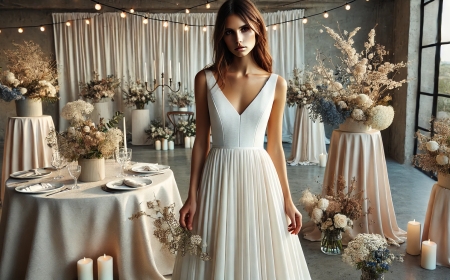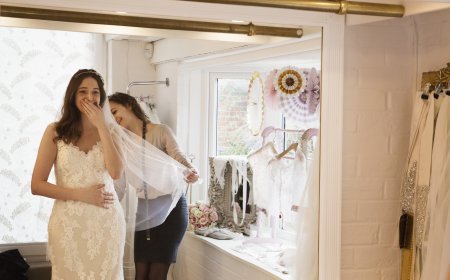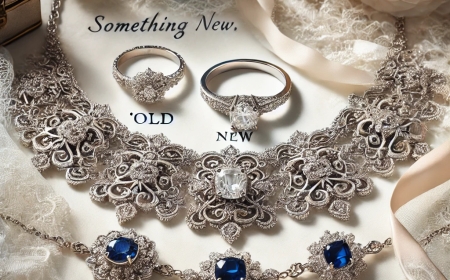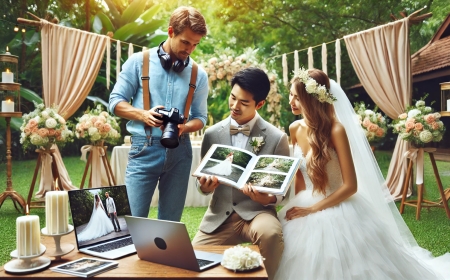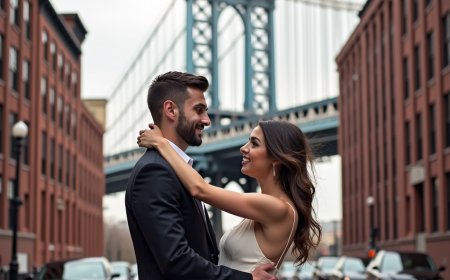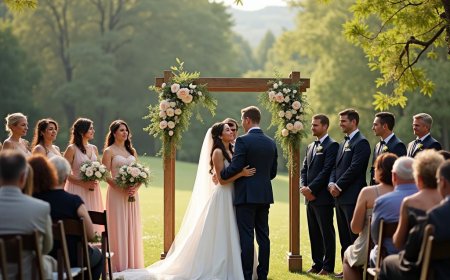How to Choose the Perfect Wedding Venue
Learn how to find the perfect wedding venue with this detailed guide. From guest count and parking to layout planning and restrictions, discover tips for choosing a venue that matches your vision, theme, and logistical needs
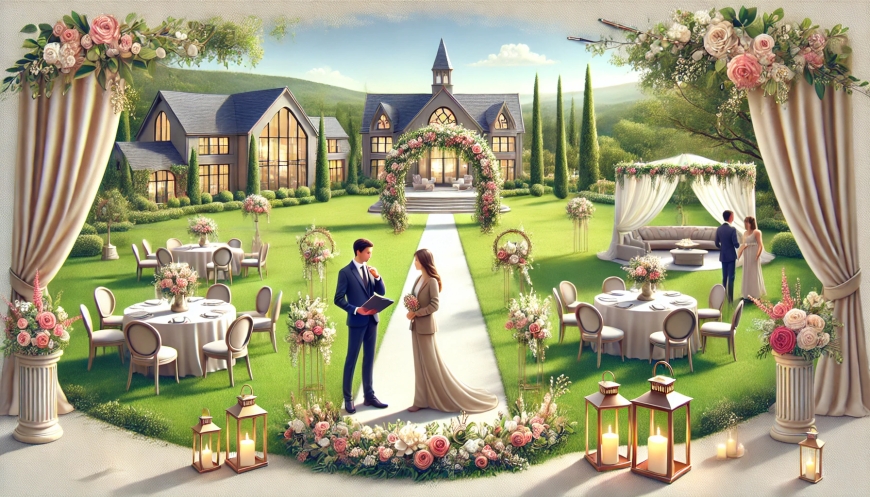
Choosing the perfect wedding venue is one of the most critical decisions you'll make when planning your special day. The venue sets the stage for your celebration and impacts the atmosphere, logistics, and overall experience for both you and your guests. Just like buying a new home, finding the right venue takes careful thought, planning, and a bit of intuition.
This comprehensive guide will walk you through everything you need to know about selecting the best venue for your wedding, from considering size and logistics to ensuring it aligns with your vision and theme.
Why the Venue Matters
The wedding venue isn’t just a backdrop for your event—it’s where memories are made, vows are exchanged, and your love story is celebrated with family and friends. A well-chosen venue ties together your wedding’s theme, mood, and functionality, ensuring everything flows seamlessly.
Step 1: Start Early and Plan Ahead
Begin the Search Early
- Start looking for venues at least 12 to 18 months in advance, especially if you have a specific wedding date in mind.
- Popular venues often book out quickly, particularly during peak wedding seasons like spring and summer.
Give Yourself Time
Rushing this decision can lead to regrets. Take your time to visit, evaluate, and compare multiple venues. This also allows flexibility if unforeseen issues arise or you change your mind.
Step 2: Trust Your Instincts
When you step into a venue, you’ll often get an immediate vibe—either it feels right, or it doesn’t. While practical considerations are essential, your initial gut reaction can guide you toward the venue that truly resonates with your vision.
- If a venue gives you a warm, inviting feeling and aligns with your dreams for the big day, it’s a strong contender.
- If something feels off, no matter how practical the venue seems, it might not be the right fit.
Step 3: Consider Venue Size and Guest Count
Match Venue Size to Guest Count
- A venue that’s too large can make your wedding feel impersonal, while a too-small venue will feel cramped and uncomfortable.
- Before venue hunting, create a rough guest list to determine your approximate headcount.
Be Precise
- Avoid wide ranges like “150–400 guests.” Narrow it down to a more accurate range, such as “150–200 guests,” to ensure you choose a venue with the right capacity.
- Check if the venue has flexible seating arrangements to accommodate changes in guest count.
Dance Floor Considerations
- For a large guest list, ensure the dance floor is proportionate. A 10x10 dance floor won’t work for 300 guests. Discuss this detail with the venue staff to avoid miscalculations.
Step 4: Evaluate Accessibility and Parking
Parking Spaces
- Lack of parking is one of the most common complaints at weddings. Ensure the venue has adequate parking for your guest count.
- For urban or destination venues with limited parking, consider providing a shuttle service or nearby parking options.
Accessibility
- Ensure the venue is easily accessible for guests, especially those with disabilities or mobility challenges.
- Check for ramps, elevators, or other accommodations if necessary.
Step 5: Check Venue Restrictions
Every venue has its own set of rules and restrictions. It’s vital to understand these before booking to ensure they align with your plans:
- Time Restrictions: Some venues require events to end by a specific time, while others allow all-night celebrations.
- Noise Limits: Certain venues may restrict live bands, DJs, or amplified sound due to local ordinances.
- Decor Restrictions: Confirm if the venue has rules about hanging decorations, candles, or other embellishments.
- Catering and Vendor Policies: Ask if the venue allows outside caterers, florists, and decorators, or if you must use their preferred vendors.
Being clear about these restrictions early on will prevent misunderstandings and disappointment later.
Step 6: Visualize Your Layout and Plan
Map Out the Event
Before finalizing a venue, create a basic layout plan that includes:
- Guest seating arrangements.
- Ceremony area (if held on-site).
- Reception, dining, and dance floor areas.
Test the Fit
Visit the venue with your layout plan in mind. Ensure there’s enough space for all elements without overcrowding. If possible, bring your planner or coordinator along for additional insight.
Step 7: Consider the Venue’s Aesthetic
Match the Venue to Your Theme
- Rustic barns are ideal for countryside or boho-themed weddings.
- Ballrooms exude elegance for formal black-tie events.
- Beaches and gardens provide a natural, relaxed setting for outdoor weddings.
Seasonal Considerations
- For winter weddings, ensure the venue has proper heating and indoor accommodations.
- For summer weddings, prioritize venues with shaded or air-conditioned spaces.
Step 8: Budget Wisely
Understand the Costs
Venues often account for a significant portion of your wedding budget. Be clear on the following:
- Rental fees and what they include (tables, chairs, linens, etc.).
- Additional costs like overtime fees, cleaning charges, or corkage fees.
Compare Value
A slightly pricier venue that includes essentials (like catering or décor) may offer better value than a cheaper venue requiring many rentals.
Step 9: Read Reviews and Ask for References
Online Reviews
Search for reviews on Google, Yelp, or wedding-specific platforms like The Knot or WeddingWire. Pay attention to recurring themes in the feedback.
References
Ask the venue for references or testimonials from couples who’ve hosted their weddings there. Speaking directly with past clients can provide valuable insights.
Step 10: Have a Backup Plan
Even with the most careful planning, unexpected issues like bad weather or logistical challenges can arise. Confirm if the venue has:
- Indoor alternatives for outdoor weddings.
- Backup power sources in case of outages.
- Staff to handle emergencies or last-minute adjustments.
Conclusion: Finding Your Dream Wedding Venue
Choosing the perfect wedding venue requires a blend of practicality, intuition, and thoughtful planning. By starting early, considering all logistical factors, and aligning your choice with your theme and vision, you can find a venue that sets the stage for a truly magical celebration.
Remember, a well-researched and carefully chosen venue will not only create a stunning backdrop for your wedding but also ensure a comfortable and memorable experience for your guests. With the right preparation, finding the best wedding venue can be an enjoyable and rewarding process.
Extremely Detailed Blog Post Rewrite: How to Choose the Perfect Wedding Venue
Choosing the perfect wedding venue is one of the most critical decisions you'll make when planning your special day. The venue sets the stage for your celebration and impacts the atmosphere, logistics, and overall experience for both you and your guests. Just like buying a new home, finding the right venue takes careful thought, planning, and a bit of intuition.
This comprehensive guide will walk you through everything you need to know about selecting the best venue for your wedding, from considering size and logistics to ensuring it aligns with your vision and theme.
Why the Venue Matters
The wedding venue isn’t just a backdrop for your event—it’s where memories are made, vows are exchanged, and your love story is celebrated with family and friends. A well-chosen venue ties together your wedding’s theme, mood, and functionality, ensuring everything flows seamlessly.
Step 1: Start Early and Plan Ahead
Begin the Search Early
- Start looking for venues at least 12 to 18 months in advance, especially if you have a specific wedding date in mind.
- Popular venues often book out quickly, particularly during peak wedding seasons like spring and summer.
Give Yourself Time
Rushing this decision can lead to regrets. Take your time to visit, evaluate, and compare multiple venues. This also allows flexibility if unforeseen issues arise or you change your mind.
Step 2: Trust Your Instincts
When you step into a venue, you’ll often get an immediate vibe—either it feels right, or it doesn’t. While practical considerations are essential, your initial gut reaction can guide you toward the venue that truly resonates with your vision.
- If a venue gives you a warm, inviting feeling and aligns with your dreams for the big day, it’s a strong contender.
- If something feels off, no matter how practical the venue seems, it might not be the right fit.
Step 3: Consider Venue Size and Guest Count
Match Venue Size to Guest Count
- A venue that’s too large can make your wedding feel impersonal, while a too-small venue will feel cramped and uncomfortable.
- Before venue hunting, create a rough guest list to determine your approximate headcount.
Be Precise
- Avoid wide ranges like “150–400 guests.” Narrow it down to a more accurate range, such as “150–200 guests,” to ensure you choose a venue with the right capacity.
- Check if the venue has flexible seating arrangements to accommodate changes in guest count.
Dance Floor Considerations
- For a large guest list, ensure the dance floor is proportionate. A 10x10 dance floor won’t work for 300 guests. Discuss this detail with the venue staff to avoid miscalculations.
Step 4: Evaluate Accessibility and Parking
Parking Spaces
- Lack of parking is one of the most common complaints at weddings. Ensure the venue has adequate parking for your guest count.
- For urban or destination venues with limited parking, consider providing a shuttle service or nearby parking options.
Accessibility
- Ensure the venue is easily accessible for guests, especially those with disabilities or mobility challenges.
- Check for ramps, elevators, or other accommodations if necessary.
Step 5: Check Venue Restrictions
Every venue has its own set of rules and restrictions. It’s vital to understand these before booking to ensure they align with your plans:
- Time Restrictions: Some venues require events to end by a specific time, while others allow all-night celebrations.
- Noise Limits: Certain venues may restrict live bands, DJs, or amplified sound due to local ordinances.
- Decor Restrictions: Confirm if the venue has rules about hanging decorations, candles, or other embellishments.
- Catering and Vendor Policies: Ask if the venue allows outside caterers, florists, and decorators, or if you must use their preferred vendors.
Being clear about these restrictions early on will prevent misunderstandings and disappointment later.
Step 6: Visualize Your Layout and Plan
Map Out the Event
Before finalizing a venue, create a basic layout plan that includes:
- Guest seating arrangements.
- Ceremony area (if held on-site).
- Reception, dining, and dance floor areas.
Test the Fit
Visit the venue with your layout plan in mind. Ensure there’s enough space for all elements without overcrowding. If possible, bring your planner or coordinator along for additional insight.
Step 7: Consider the Venue’s Aesthetic
Match the Venue to Your Theme
- Rustic barns are ideal for countryside or boho-themed weddings.
- Ballrooms exude elegance for formal black-tie events.
- Beaches and gardens provide a natural, relaxed setting for outdoor weddings.
Seasonal Considerations
- For winter weddings, ensure the venue has proper heating and indoor accommodations.
- For summer weddings, prioritize venues with shaded or air-conditioned spaces.
Step 8: Budget Wisely
Understand the Costs
Venues often account for a significant portion of your wedding budget. Be clear on the following:
- Rental fees and what they include (tables, chairs, linens, etc.).
- Additional costs like overtime fees, cleaning charges, or corkage fees.
Compare Value
A slightly pricier venue that includes essentials (like catering or décor) may offer better value than a cheaper venue requiring many rentals.
Step 9: Read Reviews and Ask for References
Online Reviews
Search for reviews on Google, Yelp, or wedding-specific platforms like The Knot or WeddingWire. Pay attention to recurring themes in the feedback.
References
Ask the venue for references or testimonials from couples who’ve hosted their weddings there. Speaking directly with past clients can provide valuable insights.
Step 10: Have a Backup Plan
Even with the most careful planning, unexpected issues like bad weather or logistical challenges can arise. Confirm if the venue has:
- Indoor alternatives for outdoor weddings.
- Backup power sources in case of outages.
- Staff to handle emergencies or last-minute adjustments.
Conclusion: Finding Your Dream Wedding Venue
Choosing the perfect wedding venue requires a blend of practicality, intuition, and thoughtful planning. By starting early, considering all logistical factors, and aligning your choice with your theme and vision, you can find a venue that sets the stage for a truly magical celebration.
Remember, a well-researched and carefully chosen venue will not only create a stunning backdrop for your wedding but also ensure a comfortable and memorable experience for your guests. With the right preparation, finding the best wedding venue can be an enjoyable and rewarding process.
What's Your Reaction?

















